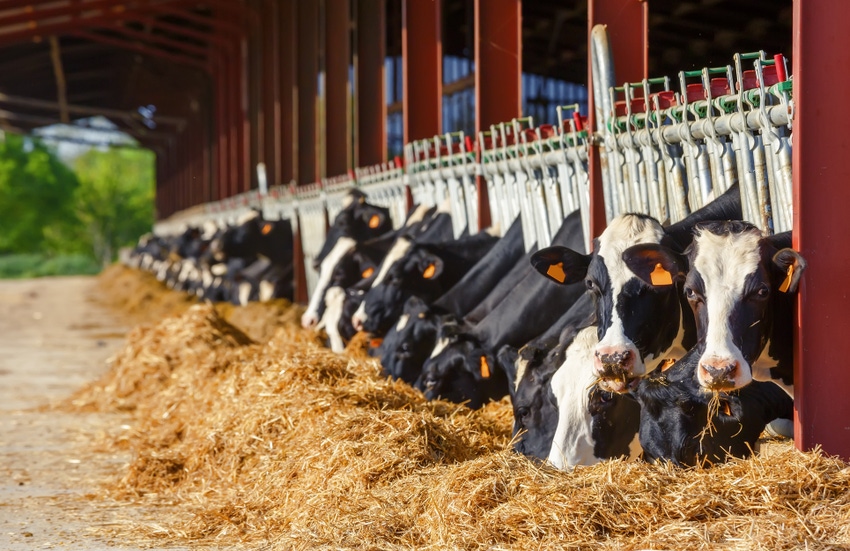MINI-SYMPOSIUM: Methyl Donors and 1-C Metabolism in Dairy Cattle
April 20, 2020

Sponsored Content
LIVE: April 29, 2020 | 10:00AM CENTRAL

Dairy cows transitioning from gestation to lactation develop fatty liver disease and associated maladies. The development of fatty liver disease may involve an inadequate supply of dietary methyl donors such as choline and methionine. The dietary supplementation of rumen-protected methyl donors is a potential means to increase hepatic phosphatidylcholine synthesis and lipid disposal. In these talks, Dr. Joe McFadden from Cornell University, Dr. Pete Hansen from University of Florida, Dr. Heather White from University of Wisconsin-Madison, and Dr. Mark Hanigan from Virginia Tech will present research focused on the ability of methyl donor supplementation to alleviate fatty liver disease, reduce hepatic inflammation, and improve milk production performance, health, and fertility in the following presentations:
Methyl Donor Nutrition in the Transition Dairy Cow: Contemporary Health Perspectives
Methyl Donors and Epigenetic Regulation of the Early Embryo
The Dual Essentiality of Choline and Methionine
Methods & Challenges for Assessing Amino Acid Bioavailability

Mini-Symposium Agenda:
10:00 AM: Dr. Joe McFadden, Cornell University
Methyl Donor Nutrition in the Transition Dairy Cow: Contemporary Health Perspectives
10:45 AM: Dr. Pete Hansen, University of Florida
Methyl Donors and Epigenetic Regulation of the Early Embryo
11:30 PM: Dr. Heather White, University of Wisconsin
The Dual Essentiality of Choline and Methionine
12:15 PM: Dr. Mark Hanigan, Virginia Tech
Methods & Challenges for Assessing Amino Acid Bioavailability

Dr. Joseph McFadden
Choline biology in dairy cattle: Contemporary perspectives and future prospects
Cornell University
Dr. Joseph W. McFadden is an Associate Professor of Dairy Cattle Biology and Northeast Agribusiness and Feed Alliance Faculty Fellow in the Department of Dairy Science at Cornell University. McFadden received a B.S. degree in Animal Science with Distinction in Research from Cornell University, a M.S. degree in Animal Science from the University of Illinois, and a Ph.D. degree in Dairy Science from Virginia Tech. He also completed a postdoctoral fellowship in the Department of Neuroscience and the Center for Metabolism and Obesity Research at Johns Hopkins University. In 2012, he joined the faculty in the Division of Animal and Nutritional Sciences at West Virginia University as an assistant professor of biochemistry. Dr. McFadden joined the faculty at Cornell University in 2017. McFadden actively studies the role of lipids in nutrition and metabolism within the physiological framework of stress adaptation and lactation in dairy cattle.

Dr. Peter Hansen
Professor
University of Florida
Peter J. Hansen is a Distinguished Professor and L.E. “Red” Larson Professor of Animal Sciences in the Dept. of Animal Sciences at the University of Florida. His research interests center around the basic mechanisms controlling the establishment and maintenance of pregnancy and development of methods to improve fertility. Particular emphasis is placed on elucidating effects of elevated temperature on early embryonic development, identifying genes controlling thermotolerance and embryonic survival, and determining how manipulation of the environment of the early embryo can program development to affect postnatal function of the calf. Another focus is on development of methods to increase profitable uses of embryo transfer. Dr. Hansen joined the faculty at Florida as an assistant professor in the College of Veterinary Medicine in 1984 and transferred to the then Dairy Science Department (now Animal Sciences) in 1986. His formal education was at the University of Illinois and University of Wisconsin.

Dr. Heather White
Assistant Professor, Nutritional Physiology
University of Wisconsin-Madison
Dr. Heather White is an Associate Professor at the University of Wisconsin-Madison in the area of dairy cattle nutritional physiology. Dr. White's research program focuses on the health and nutrition of dairy cows during the transition period and is centered on hepatic and whole-animal nutrient partitioning and metabolism. Notably, Dr. White’s research strives to determine the mechanism of nutrient partitioning, feed efficiency, and metabolic health in order to provide science-based solutions and interventions to improve dairy cow health and productivity. Heather is also a "hands on" researcher, mentor, and instructor at both the graduate and undergraduate level. Additionally, Dr. White is serving as the Faculty Director of the Dairy Innovation Hub.

Dr. Mark D. Hanigan
Associate. Professor
Virginia Tech
Dr. Hanigan began his career as a dairy farmer in Western Iowa followed by a B.S. in Dairy Science from Iowa State University, an M.S. in Animal Science from UC-Davis, a Ph.D. in Nutrition from UC-Davis, and post-doctoral work in Biochemistry and Biophysics at UC-Davis. He joined the Dairy Research group at Purina Mills in 1993 and moved to the Dept. of Dairy Science at Virginia Tech in 2005.
He works in the area of nutrient metabolism using experimental and mathematical modeling approaches focusing on protein and energy metabolism. The long-term objective of his work is to improve animal efficiency and reduce the impact of animal-based production systems on the environment while maintaining a viable industry.
He is a member of the current NRC Nutrient Requirements of Dairy Cattle rewrite committee, and the chair of the National Animal Nutrition Program Modeling Subcommittee. He is an author or co-author of more than 120 peer-reviewed research publications.
Sponsored by:

You May Also Like


.png?width=300&auto=webp&quality=80&disable=upscale)
